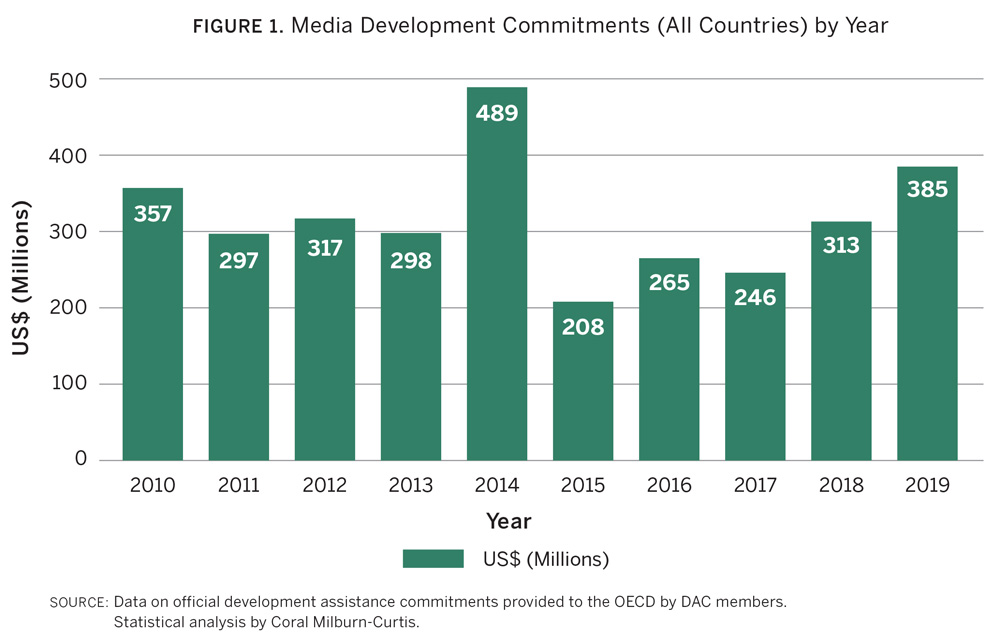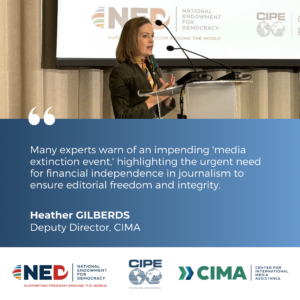By Ariane Gottlieb
2024 was a turbulent year for independent journalism. Media outlets continued to fight for financial sustainability and editorial autonomy amid deepening autocratization and a deteriorating landscape for digital freedoms. CIMA worked to identify potential responses to these challenges by mobilizing the private sector, analyzing the potential for innovative financing models, coordinating a unified strategy for multilateral support, and encouraging holistic analysis of industry-wide problems. As 2024 draws to a close, CIMA is looking back on this year’s challenges and opportunities.
Improving the Effectiveness of Media Assistance
International donor support is essential to sustaining independent media. Yet, current levels of official development assistance are insufficient to meet the needs of the sector. A report by Mary Myers and CIMA’s Deputy Director Heather Gilberds examines how the donor community has fallen short of its professed commitments to bolster media development.
Increasing donor awareness and ODA effectiveness will be crucial to improving media viability and safeguarding journalistic independence. Informed by a series of consultations with CIMA and the Global Forum for Media Development, the OECD’s Development Assistance Committee adopted the “Development Cooperation Principles for Relevant and Effective Support to Media and the Information Environment.” The principles urge donors to ensure that assistance does no harm to public interest media; increase financial and other forms of support; adopt a whole-of-system perspective; strengthen local leadership and ownership of outlets; improve coordination of support to the media and information environment; and invest in knowledge, research, and learning. The document affirms that healthy media ecosystems are necessary for democratic governance, making this a critical priority for government and multilateral stakeholders.
Innovative Financing for Private Media
Private sector partnerships and innovative financing models are also crucial for the long-term viability of independent media. CIMA and the Center for International Private Enterprise hosted a convening in Warsaw, Poland that examined how cross-sectoral collaboration can help unlock new sources of funding. CIMA and our partners similarly examined this topic at the 2024 International Journalism Festival, analyzing successful new financing methods and unpacking challenges associated with different funding models. The U.S. Mission to the European Union reiterated the importance of closing funding gaps, arguing that identifying new sources of financing will be crucial to shoring up media integrity and democratic systems writ large.
Like-minded partners must collaborate on a coordinated strategy to help independent media weather ongoing financial challenges while maintaining editorial autonomy. As part of a core group of 13 media development and donor organizations, CIMA helped develop the Media Viability Manifesto—a comprehensive document outlining how the international community can support global media development. This guide offers a three-pronged approach: fostering conceptual clarity; strengthening strategic collaboration between multiple stakeholders; and aligning practical implementation in the field of media viability.
A Systemic Approach to Media Development
Independent journalists are often forced to operate under difficult conditions, from the exclusion of marginalized communities to authoritarian attacks. Almost thirty years after the enactment of the “Beijing Declaration for Action” gender inequality remains pervasive in the media sector. CIMA and the Fojo Media Institute analyzed how media practitioners can mobilize a whole-society response in “Breaking Barriers: A Whole-of-Society Approach to Gender Equality in Media Development.”
A systemic perspective on media development must grapple with a rapidly changing and increasingly precarious digital landscape. A joint workshop by CIMA and the International Forum for Democratic Studies examined how autocratic actors have scaled up their attacks on journalists, in part by manipulating the institutions that are meant to safeguard the participatory digital ecosystem. Even attempts to strengthen global digital governance can provide authoritarians with new tools to silence dissent. For instance, the United Nations Convention Against Cybercrime, currently awaiting ratification in the UNGA, could open new vectors for transnational repression. In an op-ed for “The Hill,” CIMA Senior Director Nick Benequista explains how authoritarian actors can weaponize the United Nations Convention against Cybercrime to target independent journalists.
Ariane Gottlieb is an assistant program officer at the Center for International Media Assistance.




Comments (0)